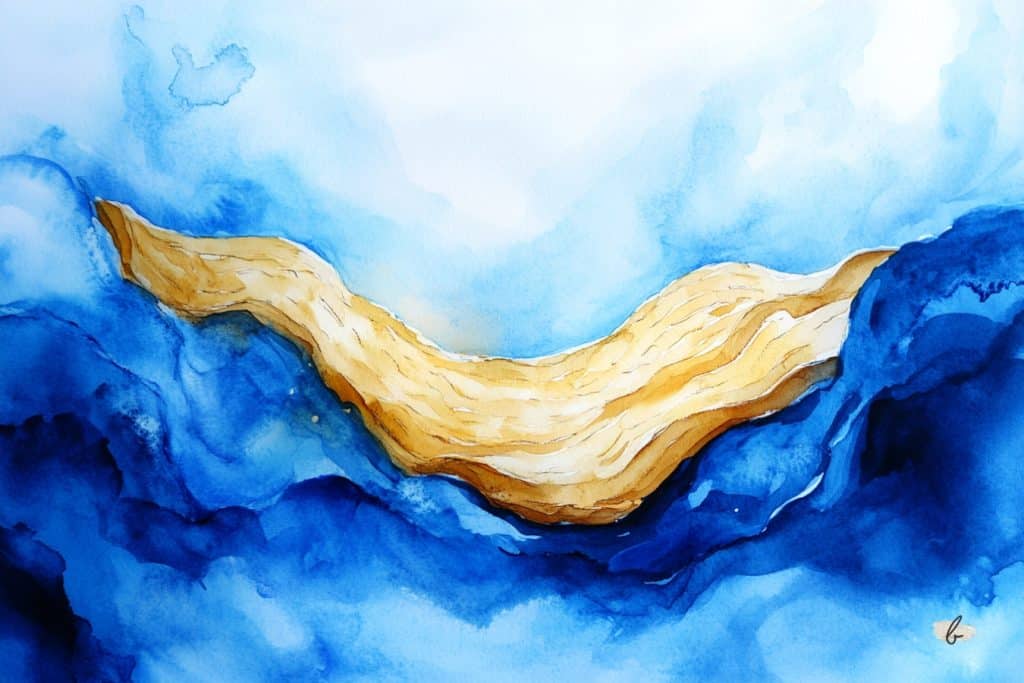The circumstance that threatens to shatter me may just be my opportunity for the splitting of my inner Sea
The moment has arrived…. We’ve all made it to here! (Pause for a well-deserved pat on the back.) For each of us, the preparation happened differently, but there’s one thing we all have in common. Whether we started the process all the way back when the first flurries of snow began to fall, or we’re of the “What’s the rush?” camp, we all based our work on one thing: A plan. For some, the plan was meticulously structured (From 5:30 to 6:00 we’re scrubbing the magna tiles). For others, it was looser, broader, more vague (This week we’re covering the kitchen). But all of us, regardless of our working style, have some vision of how we want things to go. And here’s another thing all of us human beings have in common: We don’t appreciate when that plan is messed with.
The issue is, though, that if we take a look at our lives, we’ll notice that this is exactly what keeps happening, constantly. I invite my guests for a certain time, and they show up half an hour late. I have a vision for how I want our Seder table to look, and then one kid decides he didn’t get enough grape juice or another mimics her sister’s song—and before we know it, all my plans have been dashed. And these are from the smaller dashed plans in life. Talk about visions for the kind of marriage we wished to have, the kind of home and family we hoped to set up, the kind of financial stability we envisioned…
How can we possibly tap in to the spirit of this Yom Tov—ah! Freedom— when we keep getting reminders of our powerlessness and lack of control, reminders that our hands are very much tied?
Let’s turn to the Yam Suf for inspiration this time. There’s a profound lesson we can draw from Krias Yam Suf that can help us experience a taste of redemption not only in spite of our circumstances—but through them. Commenting on the verse “The Yam saw and it split,” the Medrash asks: What did the Yam Suf see? It saw Yosef’s aron. Before he passed away, Yosef Hatzaddik requested that his bones be carried out of Mitzrayim at the time of geulah, and it was those bones that inspired the sea to split. What was unique about Yosef that it was he who the sea desired to emulate? Yosef, we know, had no easy life. (What an understatement!) But Shlomo Hamelech tells us in Mishlei that because he served his master Potiphar with such grace, he merited to become the viceroy of Mitzrayim.
How was polishing Potiphar’s shoes to an exquisite shine and folding the bed linens to perfection a merit for Yosef, we wonder. But there’s more to the story: Yosef Hatzaddik wasn’t focused on serving his human master. Rather, his life’s mission was carrying out his Divine Master’s Plan—to perfection. Regardless of what he endured, there was one question he constantly asked himself: What does Hashem want from me right now and how can I fulfill that to the fullest?
It was in this merit, tells us the Sefas Emes, that Yosef ultimately became the viceroy of Mitzrayim. He carried out Hashem’s plan even when it didn’t feel good, even when it didn’t jive with the kind of life he had in mind for himself. Through it all, he was the same Yosef: whether he was the budding talmid chacham learning with his saintly father back home, or whether he was the waiter serving a meal to Potiphar’s family. All that mattered to him was this: I want to make Hashem’s Plan mine. And if this is what He has in mind for me, I’ll give it my all. To him, tells us the Sefas Emes, sweeping a floor was like laying tefillin—that’s how at peace he was with following along with Hashem’s vision for him.
What a blessed kind of servitude! Instead of feeling enslaved to a human master, he felt privileged to serve the King of Kings.
With this perspective of Yosef, we can understand the Medrash regarding Krias Yam Suf. When the sea saw Yosef and was reminded of his flexibility and utter devotion to Hashem, it came to the recognition: I am only a sea because Hashem willed me to be a sea. If the time has now come for me to serve Him as dry land, that’s what I’ll transform into. And just like that, Krias Yam Suf happened.
The passuk tells us that the next morning, after having fulfilled Hashem’s wish of transporting the Yidden to safety, the Yam returned to איתנו, its strength. These letters can be unscrambled to read לתנאיו, its conditions. What a powerful message in this word! What is our strength, dear sisters? It’s not in what the world might call empowered or liberated or emancipated. Rather, what the modern world might call meek or weak is what we rightly perceive as eisan, strength. Our strength lies in our recognition that all our plans are on one condition: that they’re Hashem’s plan too. The moment He has something else in mind for us, we courageously relinquish control and allow ourselves to be led. That’s true courage!
And… that’s true freedom—because I can stop holding on so tight, trying to run a show that’s too big, too overwhelming, too much for me to handle… Instead, I can take a deep breath and fill myself with the clarity that this dashed plan of mine is my opportunity to grow, to let go, and, of course, to turn to Him from my discomfort.

These opportunities, dear sisters, are what we call Matzah Moments. They’re a chance for us to deflate all of our resistance, resentment, worries, fears, and tension (all the stuff that is just air) by recognizing that Hashem has a perfect plan for us, whether we understand it or not. The matzah might look like this measly mix of flour and water, but the Maharal tells us that essentially it’s the bread of strength—it doesn’t depend on any extra ingredients to give it its shape or form.
In a Matzah Moment, our sentiment is this: I can choose to be broken by this, or I can choose to recognize, “This is my opportunity to split my inner sea.”
So what does a Matzah Moment look like in real life?
1. I notice that something is triggering my human need for control.
Things aren’t going according to my plans. Whether it’s as seemingly petty as a traffic jam or a grape juice spill on the freshly starched Yom Tov tablecloth—to the way my husband is running the Seder or my mother-in-law’s hosting style, and of course the more catastrophic discomforts, all of these are perfect opportunities for a Matzah Moment, a moment of courage and greatness. It’s time for us to say, “My Matzah Moment is now.”
2. I take a deep breath.
Doing so literally fills our mind with oxygen so we can think clearly. Even just 2-3 deep breaths help us feel that we’re not in deprivation mode, which enables us to be present to our next step. We fill up on positive air to deflate the negative air—instead of being enslaved to temper, revenge, temptation, etc., we become liberated beings. We recognize that we can make a choice. Unlike the battered Yidden in Mitzrayim who were in a state of kotzer ruach, shortness of breath, from their avodah kashah, hard labor, we’re choosing not to be an eved, slave, to our instinct. Rather, we’re taking that deep, slow breath and letting clarity settle back in.
3. I internalize the clarity.
Now that I’ve taken that breath, I can focus and recognize that this is my opportunity to be exactly where Hashem wants me to be right now—and to accept it graciously. This is my chance to make His will mine, to acknowledge that He knows just what’s right for me, and that He orchestrated all these details because this is part of my purpose in this world. As incidental as it seems right now (She just happened to say this; he just happened to do that), it’s all Divinely ordained down to the last detail.
Most of all, this is my opportunity to relinquish control, to recognize that Hashem is the One who sets the conditions here. He’s the One who runs the show.
4. I say a tefillah.

In my own words, I turn to my Master and say something like, “Hashem, Your Plan is my plan. Please help me go along with this as only You can.”
And just like that, we’ve experienced our personal Krias Yam Suf right there: We chose to let go of our conditions and instead to accept His. We chose to be just who and where and how Hashem wants us to be in this moment—and to give it our all.
In the merit of exercising such superhuman courage—emulating both Yosef and the Yam Suf— in the face of disappointment, may all of us merit the Krias Yam Suf that we wish for—in the form of breathtaking miracles and the Geulah Sheleimah.
Inspire Us With Your Courage
Experienced a Matzah Moment or two over Yom Tov? Submit the details of your Moment to info@lahavinitiative.org or share it in the comments section below for a chance to win a $50 coupon toward any upcoming LAHAV project. Please include a phone number or email address so we can contact you if you’ve been chosen as the winner. Drawing will be held on Thursday, April 24.
Listen to a musical series on the Chazak hotline, where Shiffy Friedman explores the words of Hallel as a roadmap toward geulas hanefesh. Let’s sing our way to geulah together!





I just saw this now but it’s never too late. The message is profound and resonates deeply. Thanks for the beautifully written dose of inspiration!